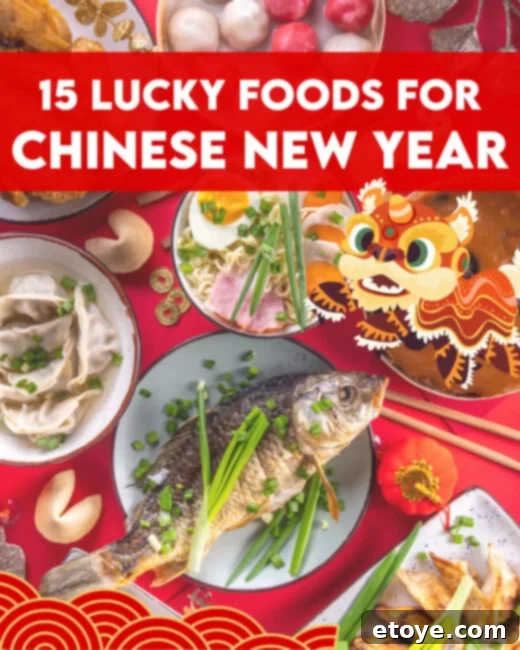Welcome to the enchanting world of the Lunar New Year, a celebration steeped in rich traditions, vibrant festivities, and, most importantly, deeply symbolic cuisine. As red envelopes are exchanged and the air fills with the aroma of festive dishes, every bite, every ingredient, and every name carries a profound meaning, weaving a tapestry of hopes and blessings for the year ahead. This isn’t just a holiday; it’s a cultural cornerstone, observed by billions worldwide, from the bustling metropolises of Asia to diaspora communities across the globe.
During this auspicious time, the distinction between good and bad luck plays a pivotal role, particularly when it comes to the food gracing the dinner table. Across diverse cultures, from the vibrant street markets of Hong Kong to the intimate family gatherings in South Korea and beyond, traditional Lunar New Year foods transcend mere sustenance. They are potent symbols, carefully chosen to usher in happiness, excellent health, abundant prosperity, and enduring good fortune for the entire family in the coming year.
The culinary traditions surrounding the Lunar New Year are a testament to the power of shared meals and collective aspirations. Each dish is a carefully crafted wish, a culinary prayer for a brighter future. Understanding the symbolism behind these foods not only enriches the dining experience but also connects us to centuries of cultural heritage and the universal desire for well-being and success. Today, we embark on a delightful journey to explore these lucky Lunar New Year foods, unraveling the auspicious meanings embedded within each one.
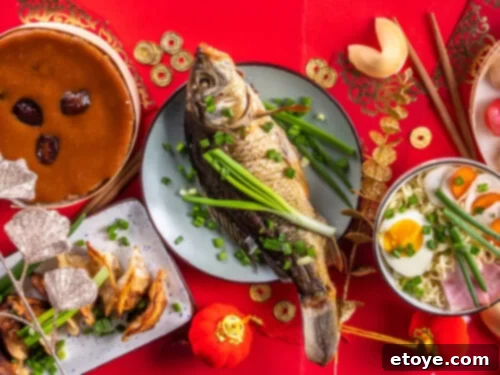
From crispy delicacies promising wealth to fruits representing unity, prepare to discover the delicious secrets behind the most cherished dishes of the Spring Festival. (And if you’re curious about which foods might bring a different kind of luck, be sure to check out our comprehensive guide on Unlucky Foods For Chinese New Year.) Let’s dive into this flavorful exploration!
Spring Rolls (春卷, Chūnjuǎn): Rolling in Prosperity

A true staple of the Lunar New Year celebration, Spring Rolls are much more than just an irresistibly crispy and savory appetizer. Their golden-brown hue and elongated, cylindrical shape bear a striking resemblance to gold bars, making them a powerful and delicious symbol of wealth and prosperity. The act of eating spring rolls during this festive season is akin to “rolling in” an abundance of wealth and good fortune for the year ahead. Each crisp bite is a wish for financial success, making them a highly anticipated dish at any reunion dinner. Whether filled with vegetables, meat, or a combination, their deliciousness is only surpassed by the auspicious message they carry.
Looking to create your own golden treasures and usher in prosperity? Try making them yourself with our very own Steamy Kitchen Spring Rolls Recipe. Your taste buds and your fortune will undoubtedly thank you for this delightful endeavor.
Pomelo (柚子, Yòuzi): A Symbol of Abundance and Family Unity
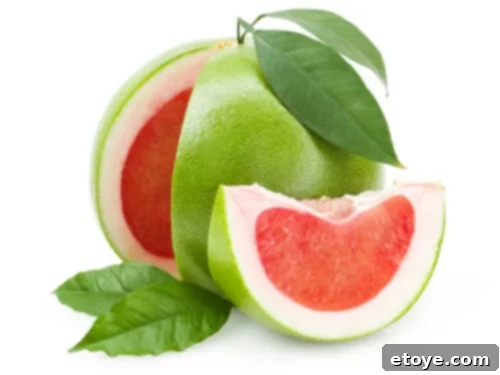
This magnificent citrus fruit, often larger than a grapefruit, is not only refreshingly juicy but also a profound symbol of family unity and abundance during the Lunar New Year. In Chinese culture, the word for pomelo, yòuzi, sounds very similar to “to have” (有, yǒu), and also echoes the word for “bless” (佑, yòu), making it an incredibly lucky fruit to enjoy and gift during the festivities. Its substantial size and plentiful segments represent prosperity and fertility, signifying that a family “has” everything they need and is blessed with a complete and harmonious household. Pomelos are often displayed as decorations or exchanged as gifts, embodying wishes for good health and an overflowing year.
For a vibrant and zesty twist that incorporates this lucky fruit, check out Linda’s delightful Pomelo Salad Recipe at Roti N Rice. Dive into a bowl of refreshingly good fortune and enjoy the sweet-tart flavors that promise a year of plenty.
Jujube (紅棗, Hóngzǎo): Sweetness, Luck, and Fertility
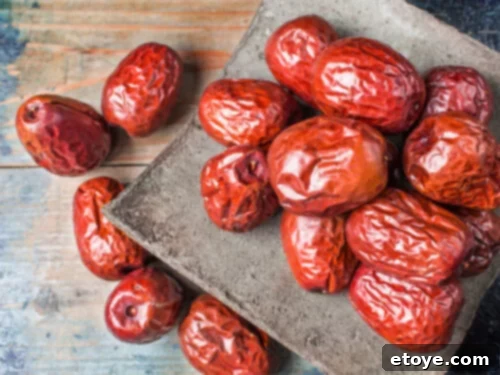
These small, reddish-brown dates, known as Jujubes, are a naturally sweet and delightful treat, cherished for both their flavor and their powerful symbolism in Chinese tradition. Their vibrant red color is universally recognized as a beacon of good luck, happiness, and prosperity, particularly during the Lunar New Year. Beyond luck, jujubes also symbolize fertility, making them a thoughtful inclusion in dishes prepared for newlywed couples or families hoping to expand. They are frequently used in a myriad of celebratory dishes, from sweet soups and desserts to savory stews, adding a touch of natural sweetness and auspiciousness to every meal. Their presence signifies a wish for a life filled with sweetness and success.
To infuse your new year with this delicious luck, try one of my personal favorites: Jeanette of Jeanette’s Health Living has an amazing Jujube Date Jam Recipe. Spread some sweetness and good fortune on your morning toast or incorporate it into other festive treats this year!
Buddha’s Delight (羅漢齋, Luóhànzhāi): A Cleansing Start to the New Year
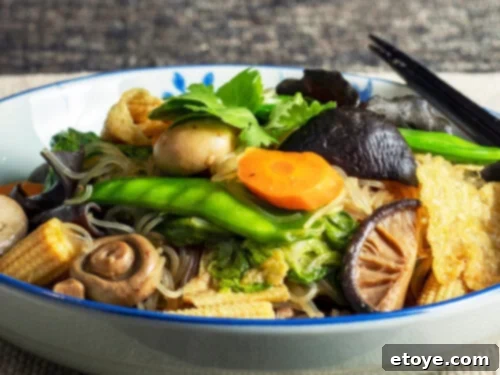
Buddha’s Delight, or Luóhànzhāi, is a classic vegetarian dish traditionally consumed on the first day of the Lunar New Year. This vibrant medley of vegetables is not merely a delicious meal but a profound symbol of purity, spiritual cleansing, and renewal. Eating Buddha’s Delight is seen as a way to purify the body and soul, offering a fresh, clean start for the incoming year. Each ingredient in this hearty dish carries its own auspicious meaning: shiitake mushrooms represent a long life, bamboo shoots signify prosperity and vitality, lily flowers symbolize a hundred years of harmony, and cloud ear fungus suggests wealth. Together, they create a dish that is both nutritious and spiritually uplifting, setting a positive tone for the year ahead.
Embark on your culinary cleanse and embrace the wholesome blessings of this dish with the excellent Buddha’s Delight Recipe from Azlin at Lin’s Food. It’s a perfect way to invite peace and good health into your home.
Chicken Feet (鳳爪, Fèngzhuǎ): Grasping Success and Abundance
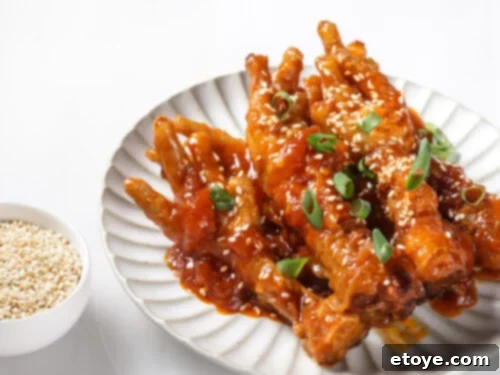
For those unfamiliar, the idea of eating chicken feet might seem unusual, but in Chinese culture, this dim sum favorite holds significant auspicious meaning, especially during the Lunar New Year. Beyond their unique texture and rich flavor, chicken feet are seen as a symbol of success, good fortune, and the ability to “grasp” or “hold onto” wealth and opportunity. The phonetic similarity between “fèngzhuǎ” (phoenix claws) and phrases related to capturing prosperity reinforces this belief. It’s a culinary metaphor for seizing new opportunities and achieving one’s goals, akin to quite literally munching your way toward success. Often braised or steamed with flavorful sauces, they are a delicacy savored by many.
Feeling adventurous and ready to grasp some good luck? Give Randy’s authentic Chicken Feet Recipe a go at Made With Lau. Who knows, this traditional delicacy might just be the lucky kick you need for a truly successful year!
Peking Duck (北京烤鴨, Běijīng Kǎoyā): Loyalty, Happiness, and Completeness
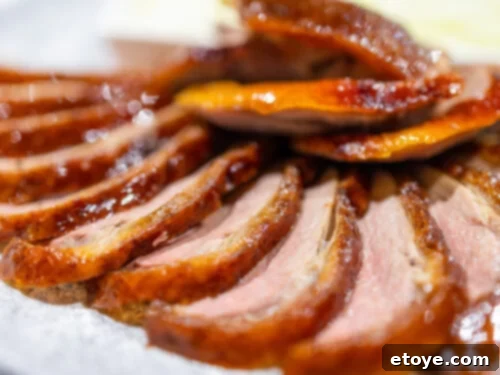
Peking Duck, with its succulent meat and famously crispy, lacquered skin, is widely considered the pinnacle of duck dishes and a true culinary masterpiece. During the Lunar New Year, it takes on an even deeper significance, symbolizing loyalty, happiness, and completeness within Chinese culture. Serving a whole duck represents completeness, peace, and prosperity for the entire family, from beginning to end. The rich flavor and impressive presentation of Peking duck also convey a sense of abundance and luxury, making it a perfect dish to share with loved ones. It’s the kind of celebratory meal that warmly communicates, “We are united, prosperous, and sharing in delicious moments together.”
Craving this magnificent dish to bring loyalty and happiness to your family table? Check out Wei’s comprehensive Peking Duck Recipe at Red House Spice. Prepare for a truly memorable feast that honors tradition and taste.
Lychee (荔枝, Lìzhī): Sweetness in Family Bonds
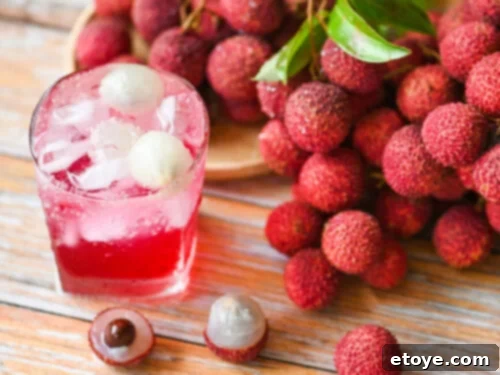
Sweet, juicy, and bursting with fragrant flavor, lychees are a beloved tropical fruit that symbolizes strong family ties, romance, and abundance during the Lunar New Year. Their inherent sweetness is thought to bring a “sweet life” and harmony to the household, while their red color further enhances their lucky appeal. Each small, succulent lychee whispers a message of “family first, and make it sweet,” encouraging close bonds and loving relationships. They are often enjoyed fresh, as a dessert, or incorporated into various festive dishes and beverages, adding a touch of exotic sweetness and good fortune to the celebrations. Sharing lychees is a gesture of warmth and affection.
For a fun, festive twist to enjoy these lucky fruits, why not mix up a delightful Lychee Mai Tai this Chinese New Year’s eve, courtesy of Kazu from Funky Asian Kitchen? It’s basically the festive spirit and sweet family love bottled in liquid form, perfect for raising a toast to new beginnings.
Longevity Noodles (長壽麵, Cháng Shòu Miàn): A Wish for a Long and Healthy Life
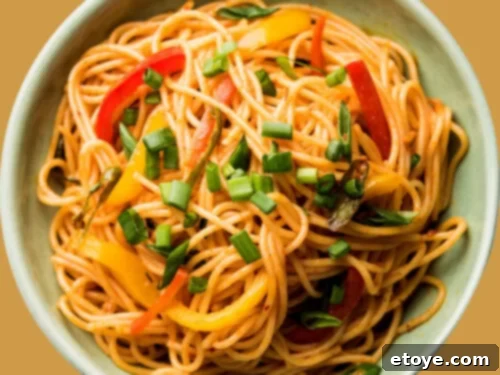
Among the most iconic and essential Lunar New Year foods are Longevity Noodles, or Cháng Shòu Miàn. These aren’t just any ordinary long noodles; they are specifically prepared and consumed to symbolize a long, healthy, and happy life. The immense length of the noodles directly represents the length of one’s life, and it is considered very auspicious to eat them without breaking or cutting them, emphasizing an uninterrupted life path. This tradition encourages slurping the noodles whole, from end to end, to ensure you “pull in” those extra years and enjoy prolonged good health. They are often served simply, in a flavorful broth, allowing their symbolic length to be the star.
Ready to try your hand at preparing these life-extending noodles and slurp your way to a longer, healthier year? Ms Shi & Mr He have got you covered with their fantastic Longevity Noodles Recipe. Embrace this delicious tradition and wish for countless healthy years ahead!
Black Moss Seaweed (髮菜, Fàcài or Fat Choy): Harvesting Wealth
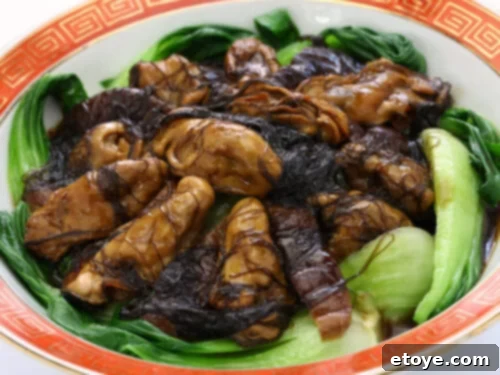
While it might resemble a bundle of tangled black strands, Black Moss Seaweed, known as Fàcài, is one of the most potent symbols of wealth and prosperity during the Lunar New Year. Its Chinese name, fàcài, sounds remarkably similar to the auspicious phrase “gōng xǐ fā cái” (恭喜發財), which means “wishing you prosperity” or “get rich.” Because of this phonetic connection, it’s an absolute must-have for anyone aiming to boost their financial fortunes and accumulate wealth in the coming year. Black moss is rarely eaten on its own due to its subtle flavor and unique texture; instead, it is typically incorporated into other Chinese dishes, such as braised meats or stir-fries, specifically to enhance the meal’s “wallet-fattening” abilities and bring forth financial blessings. It’s truly a culinary charm for attracting affluence.
Intrigued and ready to cook up some wealth? Jeanette from Wok & Kin whips up a mean Braised Mushrooms and Black Moss Recipe. Get ready to rake in that dough – figuratively speaking, of course – and enjoy the rich symbolism and flavors.
Whole Steamed Fish (魚, Yú): Abundance Year After Year
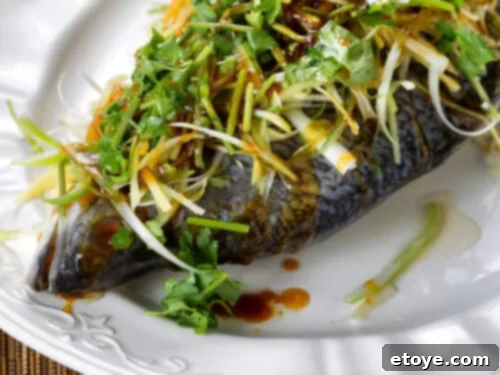
A whole steamed fish is undoubtedly the star of many Lunar New Year’s Eve dinner tables, a profoundly auspicious dish symbolizing abundance and prosperity that extends beyond the current year. The Chinese word for fish, yú (魚), sounds identical to the word for “surplus” or “abundance” (餘). Serving a whole fish, head and tail intact, signifies a good beginning and a good end for the year, ensuring that blessings and prosperity are continuous. It’s like saying, “May you always have more than enough!” A unique tradition associated with eating whole fish is to leave a portion of it unfinished. This intentional leftover symbolizes that the surplus will “roll over” into the next year, ensuring continuous wealth and prosperity. The type of fish can also carry additional meanings, with carp symbolizing good luck and catfish representing a wish for a comfortable life.
Dive into this classic tradition with Mei of Two Plaid Aprons’ authentic Chinese Steamed Whole Fish Recipe. Prepare it with care, savor its delicate flavors, and may you be swimming in an ocean of prosperity and abundance this year.
Lion’s Head Meatballs (狮子头 – Shīzitóu): Strength, Vigor, and Protection
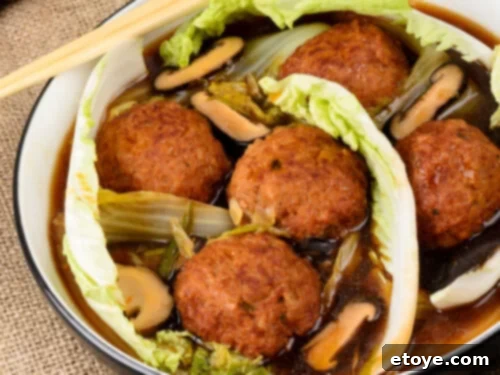
Despite their somewhat intimidating name, Lion’s Head Meatballs are a beloved and hearty dish that embodies wishes for prosperity, strength, vigor, and good fortune. These large, succulent pork meatballs, often braised with cabbage or other vegetables, are named for their resemblance to the head of the traditional Chinese guardian lion. These mythical lions symbolize protection, power, and prosperity, believed to ward off evil spirits and bring good luck. Consuming these “lion’s heads” during the Lunar New Year is a way to invite these powerful protective qualities and robust health into your home. They are a comforting and filling meal, perfect for a grand reunion dinner, symbolizing family unity and a strong, blessed year ahead.
Try making these majestic meatballs yourself and bring their powerful symbolism to your table with Sam and Dan’s recipe from Ahead of Thyme: Lion’s Head Meatballs Recipe. It’s a flavorful way to usher in a year of strength and good fortune.
Turnip Cake (蘿蔔糕, Luóbogāo): Rising Fortunes and Good Omens
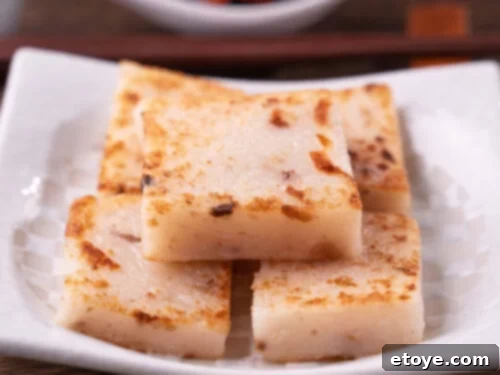
Don’t let the name “Turnip Cake” mislead you; this savory, steamed delicacy is primarily made from shredded white radish (also known as daikon) and rice flour, not the purple turnip we often imagine. In Cantonese, the word for radish, luóbo, sounds like “good fortune” or “good omens,” while gāo (糕) sounds like “tall” or “higher” (高), thus symbolizing rising fortunes and increasing prosperity with each passing year. This delicious cake, often pan-fried to achieve a crispy exterior, is a staple during the Lunar New Year, promising continuous growth, advancement in career, and general good luck. Eating Turnip Cake is like indulging in a slice of delicious good fortune, an edible charm for upward mobility and success.
Ready to give this auspicious and incredibly flavorful dish a try? Check out Thanh’s fantastic Turnip Cake Recipe over at Eat, Little Bird. Prepare to savor a dish that’s both savory and symbolically rich.
Hot Pot (火锅, Huǒ Guō): Unity, Harmony, and Warmth
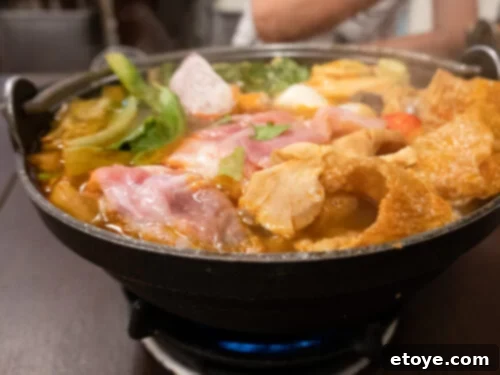
If you’ve ever had the pleasure of experiencing Hot Pot (also known as Steamboat in many Southeast Asian countries), you know it’s much more than just a meal; it’s a cherished experience. The very essence of Hot Pot, with its communal cooking style and the round shape of the pot, is a powerful symbol of unity, harmony, and togetherness in Chinese culture. It represents the family gathering around a metaphorical campfire, sharing, cooking, and enjoying the meal as one. The bubbling broth and variety of fresh ingredients chosen by each family member signify a shared journey and collective prosperity. It’s a literal circle of food, love, and warmth, fostering close bonds and creating lasting memories during the festive season.
Craving some communal cooking and a heartwarming experience? Dive into this authentic Chinese Hot Pot Recipe from CC of Asian Cooking Mom. Gather your loved ones, choose your favorite ingredients, and bring the whole family together for a truly unifying feast.
Chinese BBQ Pork (叉燒, Char Siu): Strength, Wealth, and Blessings
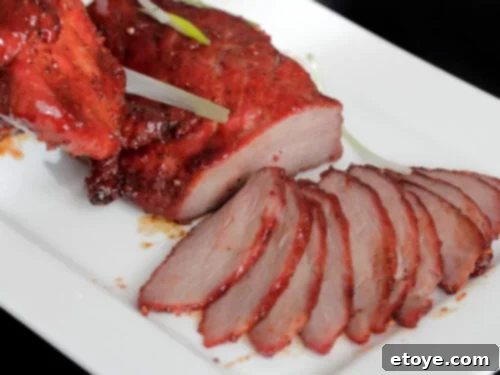
For starters, let me tell you, this sticky, sweet, and savory Chinese BBQ Pork, or Char Siu, is incredibly delicious and a highly sought-after dish. Beyond its incredible flavor and vibrant red hue (a color of luck and happiness), it also symbolizes strength, wealth, and abundant blessings for the year ahead. Pork, in general, represents strength and prosperity, and the vibrant red glaze of Char Siu further emphasizes its auspicious nature, signifying good fortune and joy. You might even think of it as an edible charm, cooked to perfection, to attract an abundance of good things into your life. Its rich taste and festive appearance make it a popular addition to Lunar New Year celebrations.
Ready to BBQ your way to blessings and savor this delectable dish? Joyce from Pups With Chopsticks has a fantastic Chinese BBQ Pork Recipe. Get that glorious glaze ready, and let the good times and good fortune roll in with every flavorful bite!
Oranges and Tangerines (橙, Chéng and 桔, Jú): Golden Symbols of Luck and Wealth
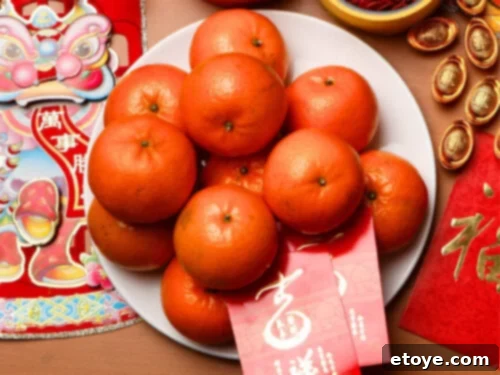
Last but certainly not least, fresh oranges and tangerines are just as fundamental to the traditional Lunar New Year as any cooked meal, universally recognized as potent symbols of luck, wealth, and good fortune. Their bright, golden-orange color strongly resembles gold, making them visually represent riches and prosperity. Furthermore, the Chinese word for orange, chéng (橙), sounds like “success” (成), while the word for tangerine, jú (桔), sounds similar to “luck” or “gold” (吉). These phonetic associations elevate them to essential status for a lucky new year. They are commonly displayed as decorations, exchanged as gifts, and enjoyed as refreshing snacks to balance out the rich festive feasting. They also symbolize completeness and fullness when given in pairs. The best part? No complicated recipe needed for these! Just peel, enjoy the burst of citrusy flavor, and soak up those powerful lucky vibes, sharing them with everyone around you.
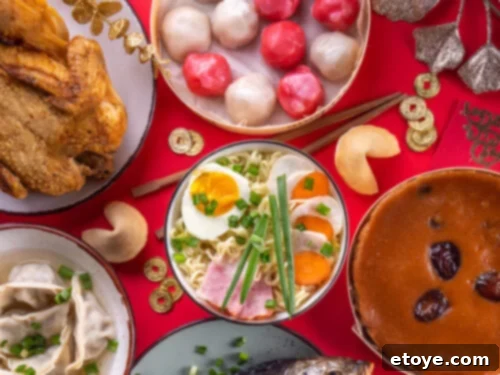
We hope you’ve thoroughly enjoyed this delicious journey through the flavors and profound symbolism of Lunar New Year cuisine. From the golden crunch of Spring Rolls to the unifying warmth of Hot Pot, each dish tells a story, carrying centuries of wishes for a joyful and prosperous future. These foods are not just ingredients; they are anchors of tradition, connecting generations and embodying the collective hopes for a truly blessed year.
Whether you find yourself expertly cooking up a storm in your kitchen, ordering from your favorite restaurant, or simply savoring these insights from afar, here’s wishing you a year filled with all the good fortune, vibrant health, and delightful deliciousness you could possibly desire. May your new year be abundant in every sense. Happy cooking, happy eating, and most importantly, Happy Chinese New Year! 🍊🍲🥢🎊
Check Out More About Chinese New Year Foods Here:
- ChineseNewYearRecipes + Superstitions
ChineseNewYearRecipes – Party Like It’s 4707!
ChineseNewYearRecipes: What to eat if you want more money!
What to Eat forChineseNewYear
